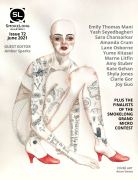Perhaps the most stunning thing about this piece is its incredible intimacy. In it, we readers are asked to bear witness without distance or the comfort of artifice. The effect is that we, like the narrator, can’t look away, and we are implicated. Can you talk a little bit about the power (and maybe even the responsibility, if there is one) of narrative to create communal witness?
Yes! There is so much unlooking when marginalised people experience violence. Even this story is essentially about an unlooking, a shrugging, an endorsement of violence because we think the person deserves it. And we could have a debate about this man’s innocence or lack thereof and where that leaves us in terms of justice but the bigger point I think, is when you’re some iteration of Black, poor and fat, you’re already constructed as deserving of violence. So my intention with this story was to refuse that unlooking. Because we’re all already implicated. And that’s definitely part of the reason we—especially marginalized people—tell stories: to “create communal witness.” If nothing else, you can’t say that you didn’t see; that it didn’t happen to us; that we didn’t exist.
The use of second person here is a really moving choice, an act of empathy and of un-othering. Was this piece always in second person, or did that evolve? For you, what is the power of second person?
Yes, this story was always in second person. Second person felt like the most efficient way to center this person that was literally being murdered. And like, I just had to do that. Moreover writing in second person, for me at least, feels like a conversation and so I always resort to it when I want to “give a voice” to someone who wouldn’t or hasn’t had it.
I think that people assume big, hard pains and problems are best explored in long forms, but I actually believe that your decision to tell this in flash is part of its success. What is it about flash that makes it work well for exploring trauma (and injustice)?
Writing this story as flash, for me, felt like the most honest way to tell this story. Because my encounter with this man was brief, barely even. It just didn’t feel right to write some drawn out piece just to make social and political commentary. Perhaps part of it was because it was a very traumatizing thing to witness and the shorter it is, the less triggering it is. So maybe it was a cowardly choice, haha. But also, I am so aware—oh so viscerally—that trauma is a searing, personal, right in the heart sort of thing and if I’m going to write about someone else’s trauma, I’m going to get right to it. And that’s the thing with flash, you don’t have the real estate to dilly-dally. You have to see who needs seeing; center what needs centering.
One of the concerns many writers have about writing violence is objectification and glorification—both of which you clearly avoid. Do you have any advice for writers on how to approach writing violence, especially in terms of trauma?
It was kind of obvious for me that the person that was experiencing this horrific act of violence is the person who should matter the most. I am almost always writing about violence from the perspective of marginalized people (Black, women, children, etc.) and I guess that clarifies things. Because these people have a very complicated relationship with violence (historically, politically.) I tell myself that as long as I am writing them as kindly and as gracefully as I possibly can, then I’m writing an honest, balanced story. So I guess that would be my advice: Focus on the person on whom the violence is imposed.
Can you tell us a little about where you write, your preferred writing space(s)?
Oh, mostly on my bed and occasionally on the dining room table. I am trying to be one of those “professional” writers who have dedicated writing spaces and hours and I guess I’m getting there—very slowly, though. I don’t know. I cry a lot when I’m writing (yes, sometimes my writing is that moving but mostly it’s because repetitive motion triggers mini-existential crises.) So maybe I’m stuck with my bed, because if I’m going to question everything I know, I’d rather be lying down.


 The core workshop of SmokeLong Fitness is all in writing, so you can take part from anywhere at anytime. We are excited about creating a supportive, consistent and structured environment for flash writers to work on their craft in a community. We are thrilled and proud to say that our workshop participants have won, placed, or been listed in every major flash competition. Community works.
The core workshop of SmokeLong Fitness is all in writing, so you can take part from anywhere at anytime. We are excited about creating a supportive, consistent and structured environment for flash writers to work on their craft in a community. We are thrilled and proud to say that our workshop participants have won, placed, or been listed in every major flash competition. Community works.